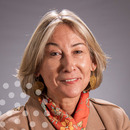Contact
Work group
Religion and Secularity (Senior Fellow summer term 2023)
Nadieszda Kizenko is a professor of history at the University of Albany, where she researches and teaches Russian history, with a focus on religion and culture. She explores the history of Orthodox Christianity, saints’ lives as a historical source, lived religion, political liturgy, women’s written confessions, and depictions of religion in film. Her first book, A Prodigal Saint: Father John of Kronstadt and the Russian People (Penn State University Press, 2000) examined the cult of a charismatic priest whose cult spanned the late nineteenth and twentieth centuries. Her history of confession in Russia spanning four centuries, Good for the Souls: A History of Confession in the Russian Empire, was published with Oxford University Press in 2021. In the summer term 2023, she is a senior fellow at the KFG in Munich.
Research Project
The Ukrainian Orthodox Church and the Orthodox Church of Ukraine: Language and Liturgy as Universal or Particularistic Choices
The liturgical choices and practices of the Ukrainian Orthodox Church and the Orthodox Church of Ukraine show the tensions between the universal and the particular or the exclusivist going back far beyond the current war. Such choices as liturgical language (Ukrainian only, Church Slavonic, possibly modern Rumanian), the veneration or demotion of saints, and the rewording of troparia traditionally glorifying the state, like those to St. Vladimir or the Elevation of the Cross, reveal fault lines that were first exposed in 1917. This presentation will outline the main liturgical differences between the two churches and consider their implications. New rites and commemorations, including those for the Holodomor, the Maidan, and the "Heavenly Hundred" and those relating to the war, will be of particular interest. To what extent does each church wish to emphasize its continuity with what came before, which pre-history do they espouse, and how do they situate their particularity in a “universal” past?
Famous Last Words
"Being part of the KFG offered a unique chance to think about my research from a fresh and fruitful angle. Is the liturgical approach of the Ukrainian Orthodox Church more or less universal than that of the Orthodox Church of Ukraine? Is one more particularist than the other? How can the notions of universalism and particularism be successfully applied to liturgy? How much preference can a secular state show for any religious group over another at a time of war? Fellows from disciplines including History, Sociology, Anthropology, Philosophy, and Political Science grappled with these questions in stimulating weekly colloquia followed by lively dinners when the discussions continued. The organizers ensured that all ran smoothly. And Munich's central location offered both convenience and Gemütlichkeit. An intellectual idyll!"
Nadieszka Kizenko | The Ukrainian Orthodox Church and the Orthodox Church of Ukraine: Language and Liturgy as Universal or Particularistic Choices as video and podcast on Wissenschaftsportal L.I.S.A.


